Inspection & Quarantine
WORK OF THE INSPECTION AND QUARANTINE BRANCH
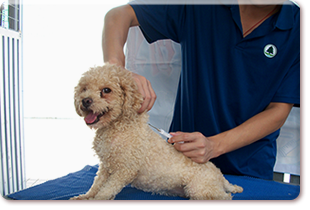
- To investigate and control outbreaks of animal diseases;
- To promote animal welfare and manage stray animals;
- To monitor and regulate the trade of animals;
- To regulate the importation of animals/plants and their products;
- To certify exportation of animals/plants and their products;
- To provide veterinary diagnostic support and surveillance services for detecting diseases and drug residues in food animals;
- To conduct livestock farm inspections; and
- To control and regulate the registration and sale of pesticides.
PREVENTION OF AVIAN INFLUENZA
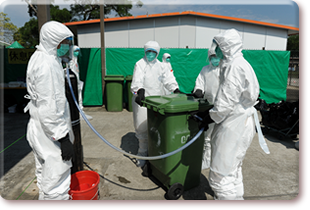
To safeguard the population against Avian Influenza (AI), the Department continued its year-round programme to monitor and screen for the presence of the virus at various sites considered to be at risk, including poultry farms, the wholesale poultry market, pet bird shops, recreational parks and nature reserves. Dead birds were collected and tested on a daily basis. Of the 7,122 bird carcasses and 45,427 swab samples collected in 2012-13 for testing, 5 wild birds were confirmed to be H5N1 infected.
Unauthorised keeping of backyard poultry (chickens, ducks, geese, pigeons and quails) is an offence with a maximum fine of up to $100,000. To enforce the ban, the Departmental staff regularly patrolled villages in rural areas as well as conducted blitz operations during the year. Two offenders were prosecuted for illegal keeping of 2 chickens and not less than 9 pigeons.
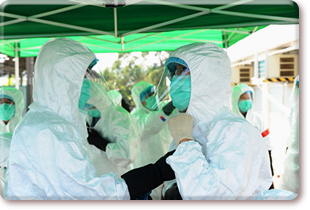
To enhance public awareness of the prevention of AI, promotional programmes were held during Mid-autumn Festival 2012 and before Lunar New Year 2013. They included paying visits to villages to disseminate messages about AI prevention, putting up of posters onto the village information boards and distributing leaflets and souvenirs to members of the public.
All imported pet birds entering Hong Kong have to be tested for AI before being released to their importers.
LIVESTOCK FARM INSPECTIONS
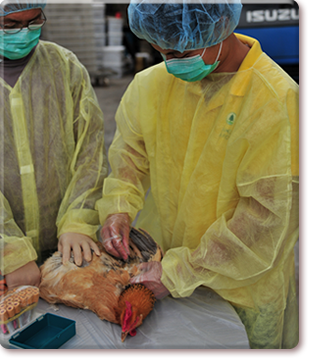
To protect the general population from AI, the Department has imposed stringent biosecurity requirements on local poultry farms in addition to the obligatory AI vaccination programme. Every batch of local farm chickens must pass the AI test before they are allowed to be sold in markets for consumption.
The Department carries out regular inspection to local pig farms and provides professional advice to farmers in terms of farm management, biosecurity, disease prevention and proper usage of veterinary drugs.
During the year, AFCD staff conducted 2,821 inspections on livestock farms and quarantined 1,058 pigs imported for breeding purposes.
VETERINARY LABORATORY
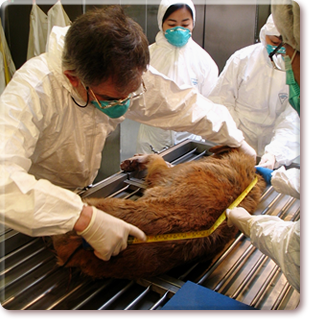
Tai Lung Veterinary Laboratory provides veterinary diagnostic support services including testing of animal pathogens and chemical residues in pre-slaughter food animals, etc. During the year, over 12,900 requests were received for animal, bird and fish disease investigation. Over 252,000 and 128,700 tests for AI and chemical residues were conducted respectively.
ANIMAL AND PLANT QUARANTINE CONTROL
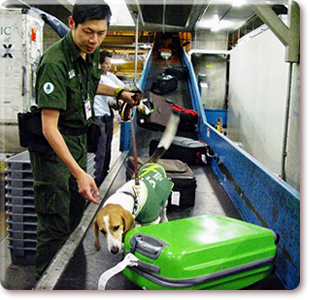
As the animal import and export control authority in Hong Kong, the Department is responsible for ensuring that all cross-border animal movements are closely monitored to prevent the introduction of animal diseases into Hong Kong.
Special permits issued by the Department are required for the import of live animals and birds in accordance with the Public Health (Animals and Birds) Ordinance (Cap 139) and the Rabies Ordinance (Cap 421). Importing animals and birds without a special permit is liable to prosecution. In 2012-13, a total of 5,999 permits were issued for the import/transit of live animals and birds.
To comply with the import requirements of destination places, the Department issues Animal Health Certificates to facilitate the export of animals and birds. A total of 3,948 applications were processed by the Department during the year.
To strengthen the efforts to prevent illegal importation of animals and to safeguard public health, the Quarantine Detector Dog (QDD) Programme commenced operation in February 2008 and QDDs are now deployed at various boundary control points including Lok Ma Chau, Shenzhen Bay and the Hong Kong International Airport.
Under the Plant (Importation and Pest Control) Ordinance (Cap 207), any plant imported into Hong Kong must be accompanied by a Plant Import Licence issued by the Department and a valid Phytosanitary Certificate issued by the competent authority in the place of its origin. For importation of insect pests, an authorisation should be obtained in advance. A total of 1,662 import licences and authorisations were issued by the Department in 2012-13.
Statistics on plant import control and phytosanitary certification services are at Appendix 9.
CONTROL ON PESTICIDES
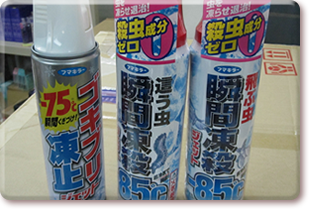 Endosulfan and Alachlor have been listed under the Rotterdam Convention since 2011. To fulfill the Convention's requirements, AFCD initiated a review of the registration status of the 2 pesticides under the Pesticides Ordinance (Cap 133). After consulting the trade, the Department cancelled the registration of the 2 pesticides on 1 January 2013. In view of the continuous concerns over the safety of Diazinon and Paraquat, the Department initiated a review of the registration of the 2 pesticides and launched public consultation on the cancellation of Diazinon and Paraquat by 2014. To ensure the safety of pesticide users and members of the public, the Department will continue to closely monitor the international regulation of pesticides and regularly review the registration of local pesticides.
Endosulfan and Alachlor have been listed under the Rotterdam Convention since 2011. To fulfill the Convention's requirements, AFCD initiated a review of the registration status of the 2 pesticides under the Pesticides Ordinance (Cap 133). After consulting the trade, the Department cancelled the registration of the 2 pesticides on 1 January 2013. In view of the continuous concerns over the safety of Diazinon and Paraquat, the Department initiated a review of the registration of the 2 pesticides and launched public consultation on the cancellation of Diazinon and Paraquat by 2014. To ensure the safety of pesticide users and members of the public, the Department will continue to closely monitor the international regulation of pesticides and regularly review the registration of local pesticides.
The Department is committed to promoting the safe use of pesticides in different sectors. The Department encourages and assists the industry to develop or update the code of practice on pesticide use. The Department also offers technical seminars to farmers on a regular basis to promote the use of good agricultural practices. For domestic pesticide users, a new set of publicity materials and guidelines on the safe use and proper labelling of pesticides were produced and distributed. Relevant information and guidelines are available on the Department's website.
Statistics on pesticide control are at Appendix 10.
PLANT VARIETIES PROTECTION
The Plant Varieties Protection Ordinance (Cap 490) provides plant breeders (or the owners of the variety) with legal means to apply for proprietary rights over cultivated plant varieties they bred and developed. Grantees are given the exclusive rights to import, export, produce and sell reproductive materials of the protected variety for a term of 20 or 25 years.
ANIMAL MANAGEMENT
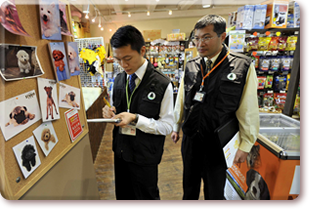
AFCD adopts various animal management measures to control animal diseases, regulate animal trading and promote animal welfare.
Rabies is controlled effectively in Hong Kong. No rabies case has been found in Hong Kong since the 1980s. In 2012-13, some 62,600 dogs were licensed and vaccinated against rabies. About 7,800 dogs and 3,400 cats were caught, received or handled during the year. Healthy animals with good temperament would be selected for re-homing. About 870 animals were re-homed through 12 partner animal welfare organisations.
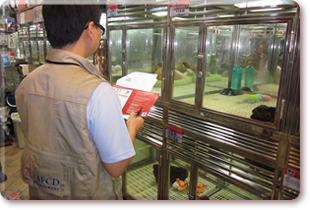
Under the law, all animal traders are required to obtain Animal Trader Licences (ATLs) issued by the Department and should strictly observe the corresponding licensing conditions. Pet shops are required to obtain dogs for sale only from approved sources. AFCD inspects these shops regularly to ensure that they do not contravene any of the licensing conditions. In 2012-13, some 430 ATLs were issued, covering the trade of dogs, cats, birds, reptiles, etc.
The Food and Health Bureau and AFCD launched a public consultation in 2012 on the proposed amendment to the Public Health (Animals and Birds) (Animal Traders) Regulations (Cap 139B) to better regulate pet trading. Over 2,700 written submissions were received during the period. The majority of the written submissions support the amendment to the Regulations, holding that the licensing of persons who breed and sell dogs is necessary. Drafting of the proposed amendments to the ordinance is currently underway.
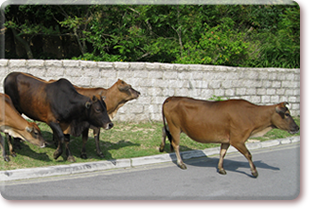
The Department has been collaborating with the Society for the Prevention of Cruelty to Animals (SPCA) and other interested animal welfare organisations to implement a "Trap-Neuter-Relocation" pilot programme for stray cattle in Sai Kung and Lantau Island with a view to controlling the stray cattle population in the long run. This will help minimise the nuisance and danger potentially caused by stray cattle to the public while at the same time safeguard the welfare of the stray cattle. A total of 70 cattle/buffalo were neutered and relocated.
Statistics on animal control and management, and the relevant permits/licences issued are at Appendix 11.
ANIMAL WELFARE
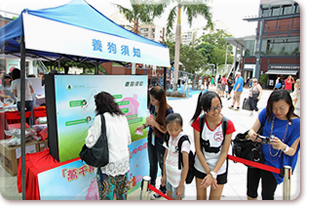
The Department promotes kindness to animals through its continued public education and publicity campaigns.
To educate the public on responsible pet ownership, raise their awareness of animal welfare and to further promote re-homing of pets, 41 school seminars, 14 estate seminars, 3 dog obedience training courses, 20 roving exhibitions, 3 animal adoption days, 1 video competition, 1 large-scale 2-day carnival, 2 roving events in railway stations and various joint educational programmes with other organisations were held in 2012-13. In addition, an education slideshow DVD in 4 languages was produced and sent to domestic helper agencies to educate the newly arrived domestic helpers about the dos and don’ts for handling dogs in public places.
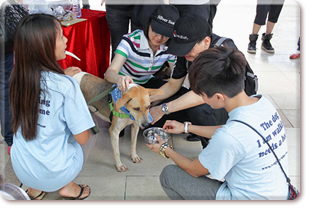
During the year, advertisements promoting animal welfare were placed in different media and public transport system such as body of buses and light buses as well as roadside bus shelters. In addition, an advertisement campaign named “Hong Kong Original” Adoption Programme was co-organised with SPCA to promote the adoption of mongrel by placing posters in railway stations. For publication, 10 new leaflets and 7 new posters were produced and distributed to the public. Seasonal e-cards for Christmas and Chinese New Year were also made to remind pet owners to take good care of their pets. In addition, a new Announcement in the Public Interest was produced and broadcast in different media to remind the public to think carefully before they get a pet. A Roadshow TV programme called “Pet Walk Diary” with 10 episodes was produced and broadcast on buses to promote the re-homing of mongrels and other animals.
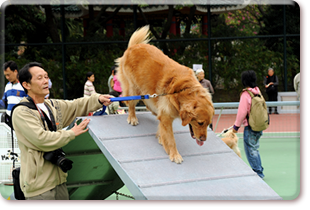
To improve the handling of animal cruelty reports or complaints, an animal welfare task force involving the AFCD, SPCA and other government departments was set up to enable better inter-departmental coordination and support for animal cruelty cases. The task force meets regularly to review the handling of animal cruelty cases, devise guidelines for each department to improve efficiency and ensure that the welfare of animals involved in these cases is well protected.
The Department has strengthened collaborations with and support to its partnering animal welfare organisations in re-homing animals, including inviting more animal welfare organisations to partner with the AFCD and providing free de-sexing services for animals re-homed through its partnering organisations.
As most of animal welfare organisations are non-profit-making with limited resources, the Department has been providing appropriate financial assistance to animal welfare organisations in organising various educational programmes to promote responsible pet ownership, animal welfare and re-homing through government subvention or assisting them to apply for funds under the Sir Robert Ho Tung Charitable Fund. In this regard, the AFCD has set aside $2 million for application by animal welfare organisations in 2012-13 for the enhancement of animal management and promotion of animal welfare.